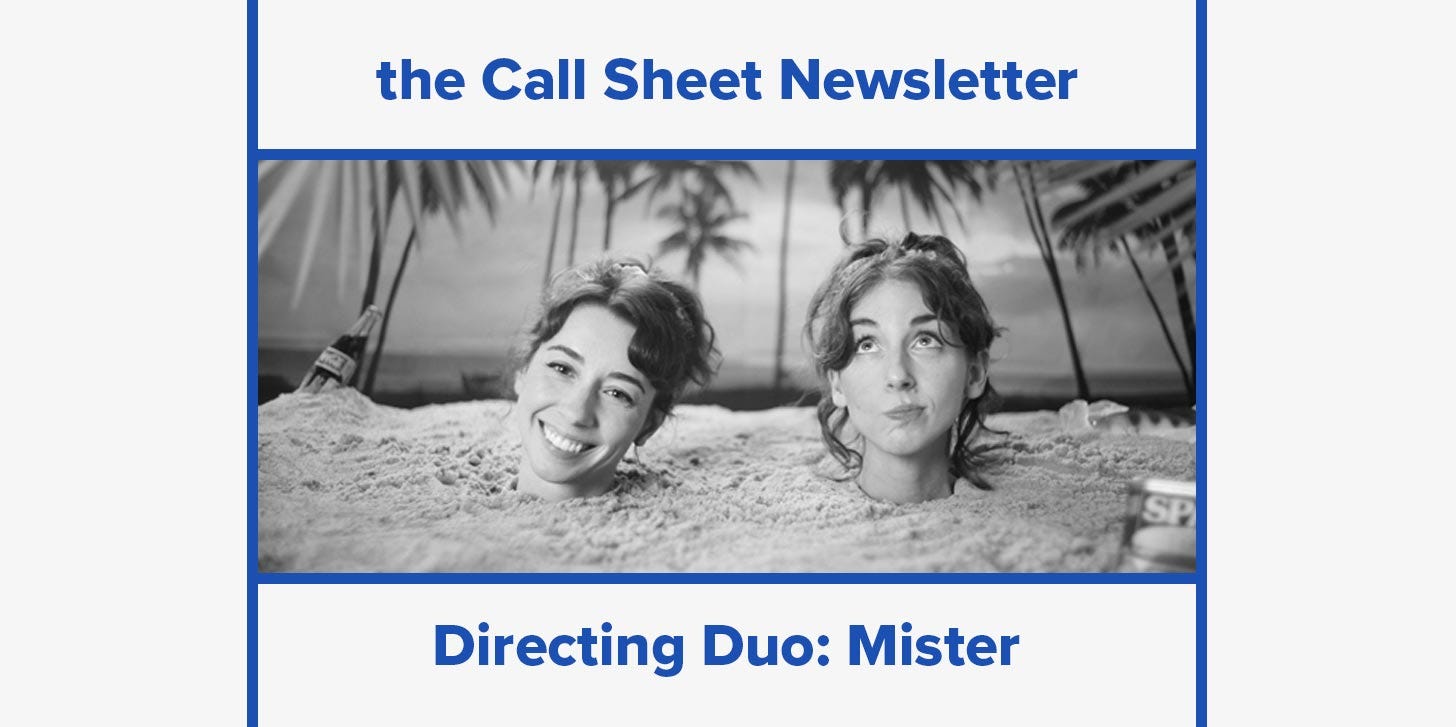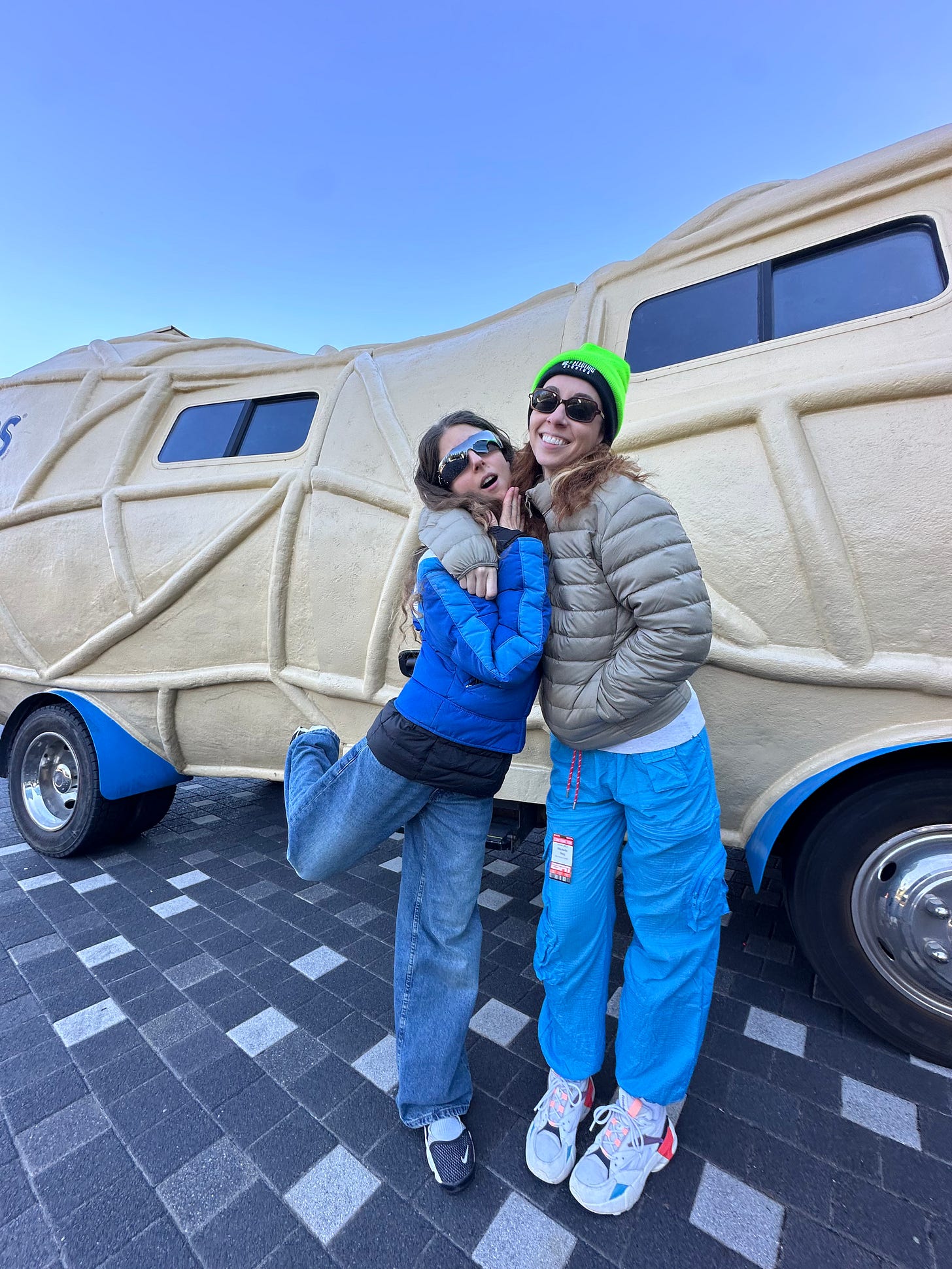Behind the Scenes with Mister
Curious about the journey behind someone's career success? Ever wondered about the minds that shaped the content you watched? I was constantly eager to understand the "how" and "why." That curiosity not only propelled my professional growth but also forged invaluable connections and unveiled some secrets of the trade.
That same curiosity led me to launch a series of interviews in this newsletter. Through these conversations, I connected with collaborators, mentors, and silent inspirations who left an indelible mark on my journey, and I'm thrilled to share a deeper look at what they do.
Let's dive into the stories behind the scenes, this time with Mister, an unconventional directing duo making you look twice at the ads they create.
Rose & Miche, appreciate y’all being willing to answer some questions! For starters, how do you explain to your non-advertising friends what it is you do?
Our role is to take the creative and breathe life into it. What does the world look like? Who are the characters? What’s the tone we want to feel in the work and how to execute that? And for us specifically, how can we find unexpected ways to add humor. That’s our job.
How did you both get started in directing, and what led to forming Mister? Was it always your plan to work as a duo?
We were a duo from day one. After years of working together as creative partners in the advertising world, we saw so many of our projects get passed on to directors and somewhere along the way, we felt that the vision got lost or that we would’ve made different choices. This happened so many times that one day we said, “hey, what if we did it ourselves.”
What attracted you to commercial directing?
It just felt like a natural progression of our creative career. We’d been on set enough working with directors that it felt like a good idea to stop playing telephone and just execute our own vision.
Can you share a project that was pivotal in shaping Mister’s voice?
Directing the Truth work was really eye opening for us. We were basically handed a project and told to “do what you do.” It was the first time the reigns were really handed to us and we could just create the way we wanted. When it was all said and done, we both walked away with a better understanding of our style and ourselves. Because what came out of that was this absurdist humor that felt really unique in the ad space and sort of broke the rules of conventional advertising. And when you’re in the thick of a project solving problems and making decisions, you can only hope it all comes together, so it was really rewarding when it did. It showed us who we are and what we’re capable of doing.
Directing duos aren’t that common. What makes your partnership work, and how do you divide responsibilities?
Well, it’s always been very clear that we have completely opposite sides of the same brain, and that probably largely comes from the fact that one of us has a writing background and the other art direction. We can watch the same shot together and both instinctively look at completely different things. On set, Rose is mostly responsible for tone and performance and making sure that’s coming through in every decision we make. We consider her more micro. Whereas Miche is more of the macro eye behind the camera with the DP, thinking through the timing of talent actions in regards to the edit, the art direction, and just generally making sure everything is visually looking good and making sense. And because we’re so aligned on the project going into the shoot, it really allows us to split up in this way in service of one vision.
Have you ever disagreed creatively, and how do you navigate those moments?
To be honest, we actually RARELY disagree creatively. And if we do, it’s usually because of a misunderstanding. Sometimes we’ll talk in circles just for it to end in one of us saying, “no, yeah that’s what I’m saying” and the other to say “no, that’s what I’M saying.” Something we have run into is that sometimes in the edit, there’s a take where the performance is amazing, but the camera doesn’t look as perfect (or vice versa) and we’ll have to compromise about what’s most important to telling the story.
Have you taken any creative risks that paid off unexpectedly?
JanSport was our first musical comedy work. We had initially pushed for pre-recorded songs, but it ended up that all of the singing was recorded live on the day. It was definitely a risk and a challenge, but it ended up giving the spots that authentic, unpolished feeling we were going for.
Can you tell us about the collaborators you frequently work with and what makes those relationships effective?
We definitely have our A-team of collaborators, specifically for editing and cinematography. The amount of mental relief you get working with your go-to DP can’t be overstated. Because at the end of the day, you know at least it’s going to look great. And our DP often contributes visual ideas we hadn’t thought of. And then editing is pretty much THE most important part of executing comedy, so knowing we have someone who can help mine for the best performances or come up with unique ways to bring the humor out is so crucial.
What advice would you give to aspiring directors breaking into commercial filmmaking?
Make as much spec work as you can – if you can do stuff with animals great, with VFX great. As broad of a range as you can. The biggest hurdle in landing work is that clients tend to lack imagination, so unless they see something in your reel that feels like a perfect match for the work they want to do, they get scared and tend to go with someone more seasoned.
Do you see advantages in working as a duo versus solo, and what should potential partners consider?
We could say the big advantage of being a duo is always having another brain to bounce ideas off and make the work better but tbh, it’s really always having someone to commiserate in the trenches with you or be next door in your crappy hotel in god knows where-ville. It would be SO boring to do this alone. But it’s also nice to be able to divide and conquer on some of the pre-pro work once you’re in the weeds. The one thing people should consider is that two people means the paycheck is split, so you have to work twice as much to make it financially lucrative. People don’t talk about that much, and honestly we’re still figuring that part out ourselves.
What have been the most effective ways you’ve built relationships and found work in the industry?
Our connections from working in the ad industry for a decade have been hugely helpful to us. But also, just our creative output and the attention that brings in. Don’t underestimate the power of posting and stalking on LinkedIn – that’s where the creative decision makers spend their time.
Looking back, is there anything you wish you had known when you were first starting out?
I don’t think we realized just how much work went into the treatment process and how it’s always unpaid. We also didn’t realize that projects with such small budgets would still triple bid, which honestly feels really crazy a lot of the time.
Have you ever questioned your path in directing, and if so, what helped you push through those moments?
Candidly, we still question our path. Directing is a real gamble, and breaking through can feel really tedious. But every time a new project comes in that feels exciting to us, we’re reminded of why we do this. Because we love making things and we love to make people laugh.
Thanks y’all, so excited to see what you make next!







